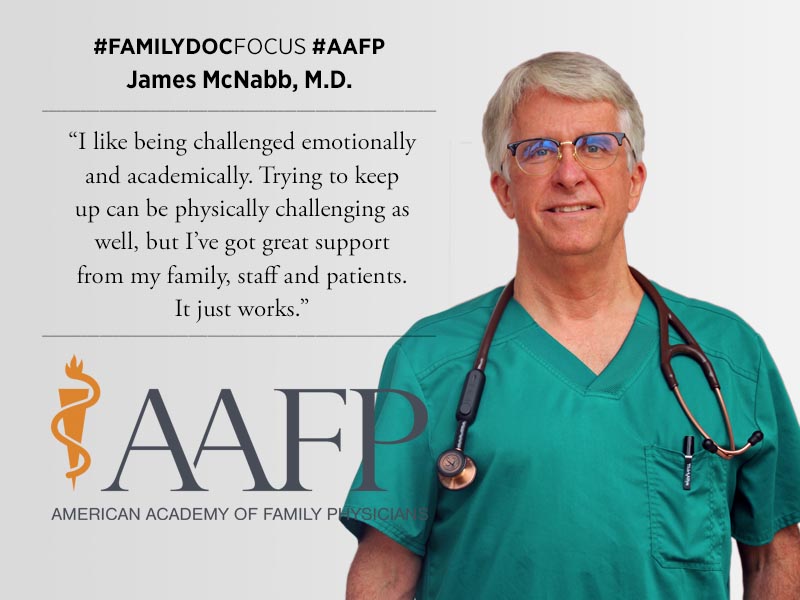Film Shows How Private Practice Is Coping With COVID-19
September 14, 2020, 4:08 pm David Mitchell -- When award-winning documentary filmmaker Bryce McNabb needed a new topic to focus on, James McNabb, M.D., suggested his son "film the real heroes" in the ICUs. The younger McNabb instead turned his camera on his father to see how the small-town family doctor, his patients and his practice were coping with COVID-19.

"I told him, 'I'm not doing anything different from any other family physician,'" said McNabb, who started his practice in Mooresville, N.C., in 1985. "Bryce said, 'That sounds perfect.'"
Bryce McNabb visited his father's practice at Full Circle Family Medicine of Piedmont HealthCare in Mooresville, N.C., for three days in early May when the pandemic had cut his patient volumes by half.
"It was a stressful time," said James McNabb, who endured about 10 weeks of decreased patient visits and was forced to reduce his staff's hours.
The staff resumed full-time work at the end of June, and he said in late August that his patient volume is "relatively back to normal" when factoring in telemedicine visits and curbside care in the parking lot for those who might have COVID-19. One of the practice's two nurse practitioners retired in August, however, primarily due to her family's concerns about her exposure risk.
In roughly 10 minutes, Bryce McNabb's film, "Plague on the Practice," touches on a number of other challenges presented by COVID-19, including scarcity and cost of personal protective equipment, testing, patient anxiety, and delayed care. The film has been viewed more than 10,000 times across all the digital platforms on which it has been released and is entered in the Raleigh Film and Art Festival, which will be held virtually this year, Oct. 2-4.
The Washington Post took note of the film and included McNabb in a recent business feature about the struggles of independent practices during a pandemic.
"It's definitely not a promotional video," James McNabb said. "My son wanted to tell a story about how private practices are coping. We didn't realize it was going to take on a life of its own."
McNabb didn't need to be the star of a film to earn the appreciation of the community he's served for decades.
"There's been an outpouring of support from our patients," he said. "We've had people dropping off food and thank-you cards."
One patient donated a substantial supply of PPE, including gloves and masks, and then later returned with custom-made, 3D-printed face shields for McNabb and each staff member.
"He knew we were struggling and wanted to help in any way he could," McNabb said.
This is actually McNabb's second stint in Mooresville, where he started his practice 35 years ago. In the 1990s, he "felt the urge to teach" and worked in family medicine residency programs in Wyoming, Arizona and North Carolina before returning in 2001. Along the way, he served on the Board of Directors of both the Arizona AFP and the North Carolina AFP.
"I truly missed private practice," he said. "I take care of so many people. My real joy is coming to work every day and working with my dedicated staff and patients."
McNabb still is actively involved in education. Medical students and residents occasionally rotate with him, and since 2002 he has been teaching a two-day dermatologic procedures course for the National Procedures Institute that is managed by the Texas AFP.
He's led joint injection workshops at the AAFP's annual meeting every year since 1999. This fall he'll be teaching the class online during the virtual Family Medicine Experience.
McNabb literally wrote the book on joint injections. A Practical Guide to Joint & Soft Tissue Injections was first published in 2005, and McNabb is close to releasing the fourth edition with co-author Francis O'Connor, M.D., M.P.H.
When he's not practicing, teaching or writing about medicine, McNabb plays lead trombone in the Lake Norman Big Band, which includes fellow trombonist and family physician L. Allen Dobson, M.D., of Mount Pleasant, N.C.
"It's a great outlet," McNabb said. "We have the best time doing that. I like being challenged emotionally and academically. Trying to keep up can be physically challenging as well, but I've got great support from my family, staff and patients. It just works."